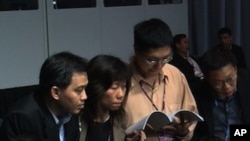After two weeks of deliberations and negotiations, representatives of more than 190 nations have concluded the Uniten Nations Climate Change Conference in Cancun, Mexico with agreements to establish a fund to help poor countries deal with climate change and a body to help nations adapt. But the biggest achievement may have been keeping the process alive.
After a marathon session that went into the early morning hours Saturday, the climate change conference came to a close with a range of broad agreements.
Mexican President Felipe Calderon, speaking as leader of the host nation, hailed the achievement. "With this accord you have altered the inertia and have changed the feeling of collective powerlessness for hope in multilateralism," he said.
One of the key agreements here in Cancun was the creation of a global fund through which industrialized nations will provide support to both climate change mitigation and adaptation in poor nations.
Expectations were low for this conference, following what was widely seen as the failure of last year's conference in Copenhagen. Many participants and observers from non-governmental organizations were questioning the multilateral process itself. But environmental groups expressed satisfaction with what was accomplished here in Cancun, saying the talks had moved the process forward on several fronts raising expectations for next year's conference in Durban, South Africa.
Tara Rao, Senior Policy Advisor on Global Climate for the World Wildlife Fund, told VOA this conference was productive. "I think this is a good start. This is something that provides the foundation to move forward. I think we have elements here that provide a good move towards putting together a legally binding agreement for South Africa," she said.
Rao says what is most important in the results of the Cancun meeting is that nations moved forward on all of the main issues rather than concentrating on only a few. She says this will help next year's conference participants work on a full package rather than just parts.
But not everyone was that optimistic. Some observers from non-governmental organizations say that, while Cancun did move the process forward, it would be unrealistic to expect a full, comprehensive agreement by next year.
One sticking point that remained at the close of this conference concerned the so-called REDD program. REDD is an acronym for Reducing Emissions from Deforestation and Forest Degradation. Coming into the conference this was seen as the program with the most potential for broad agreement, but negotiations fell into a morass of details over financing and implementation of the plan to fund forest preservation in poor countries. Conferees ended up approving a watered-down agreement with Bolivia holding out in protest.
Environmental organizations say progress on REDD is crucial since a forest operates as a carbon sink - pulling in carbon dioxide from the atmosphere. Every year more than five million hectares of forests are lost to logging around the world. Climate activists say it is crucial to put an end to that and to encourage preservation and protection of forests.
